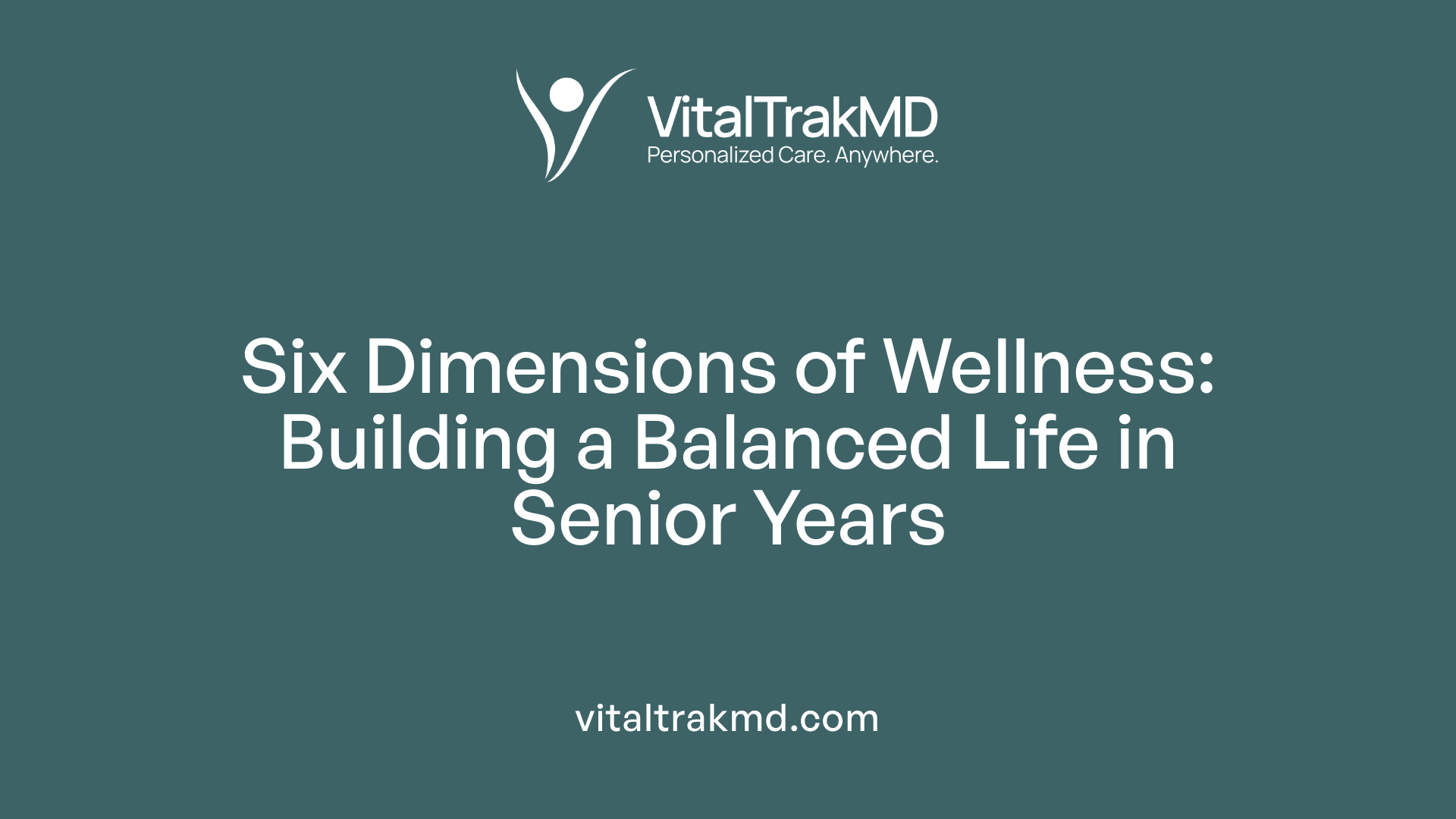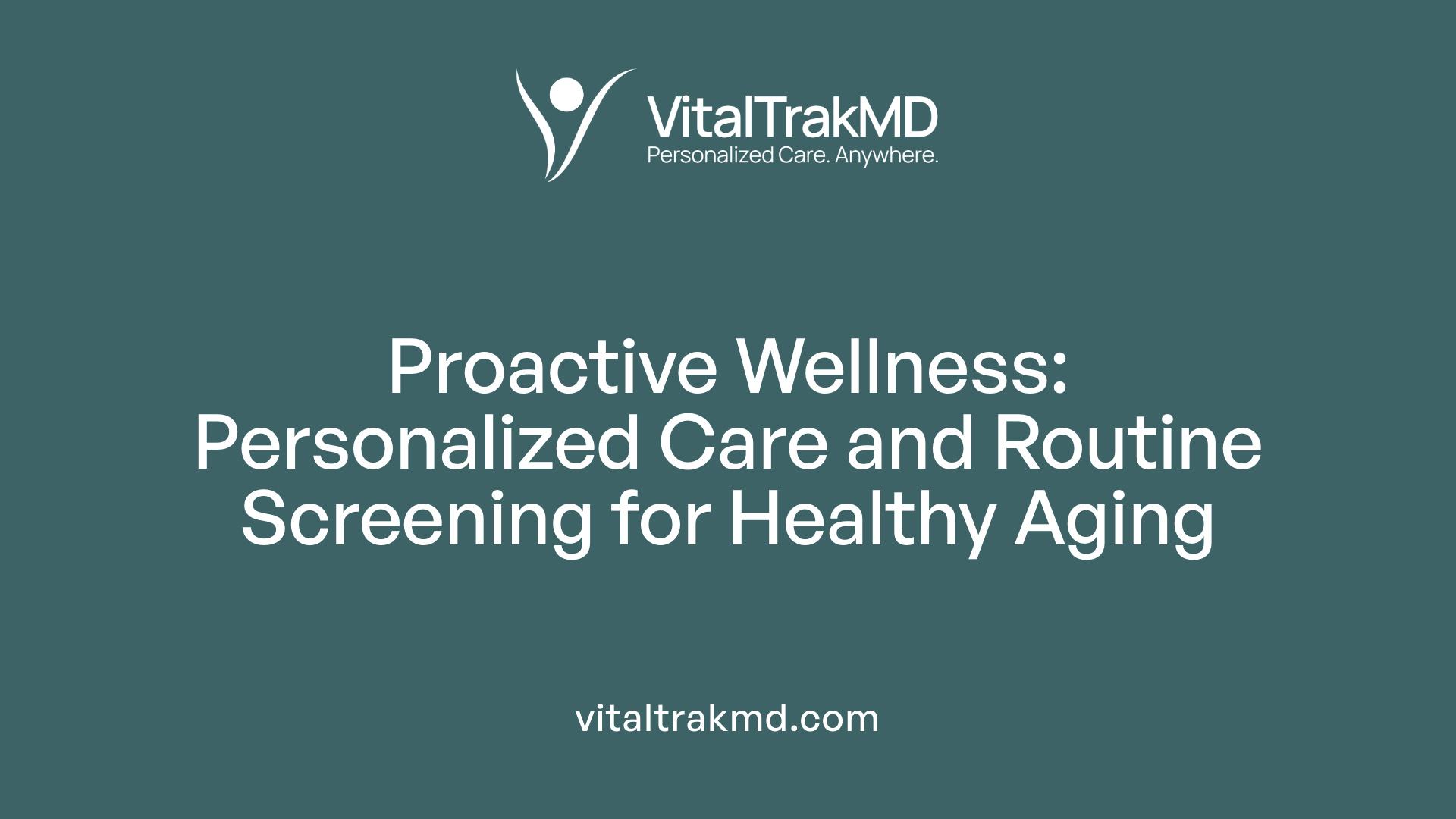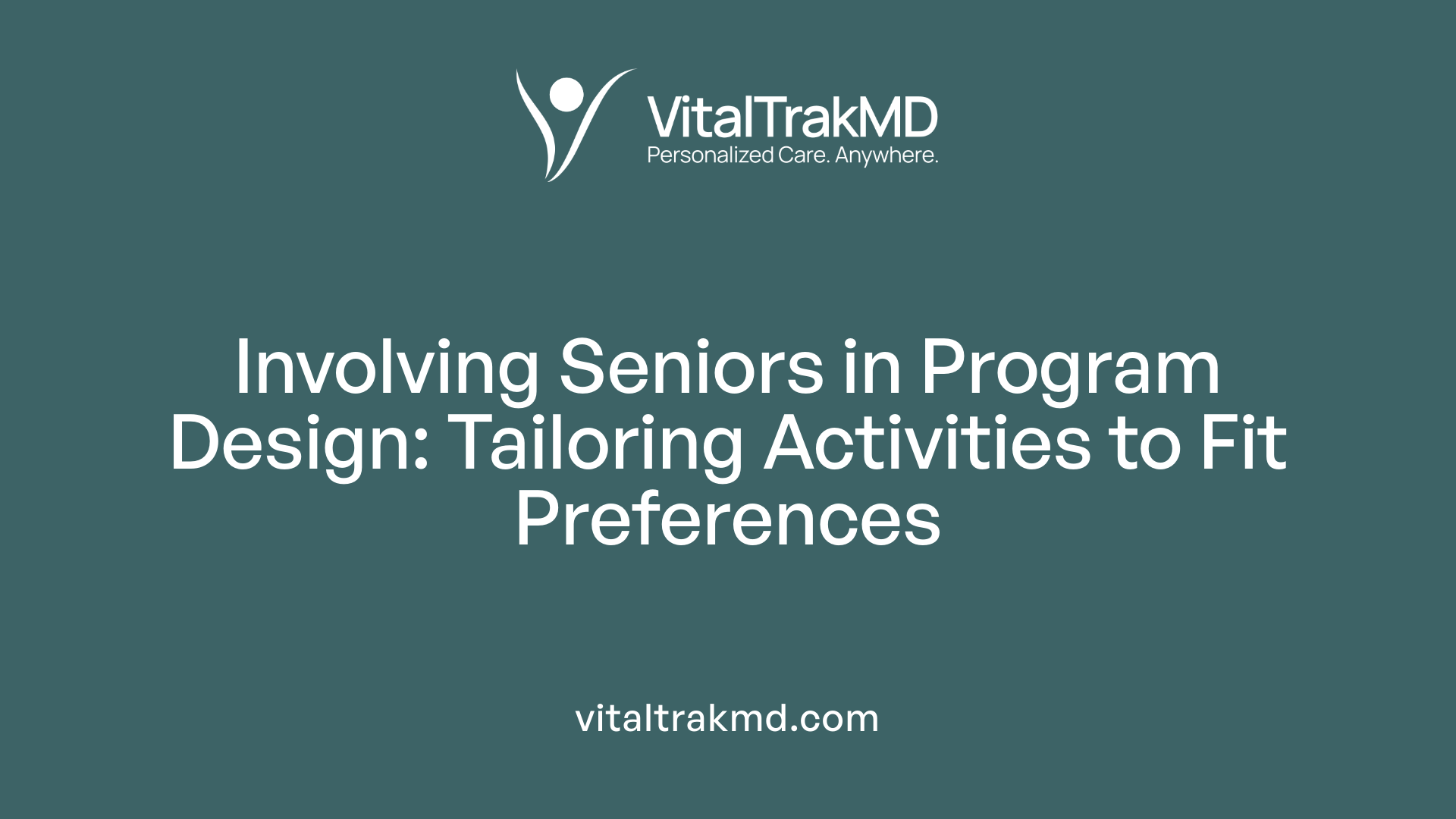How Hybrid Programs Create Structure in Senior Health Routines

Addressing the Complexity of Senior Health with Structured Hybrid Support
As the senior population grows, so does the need for comprehensive wellness approaches that address the intertwined physical, mental, social, and emotional health challenges they face. Hybrid wellness programs, combining in-person and digital tools, are increasingly recognized as effective methods to create structure in seniors' health routines, helping manage obesity, chronic conditions, and cognitive decline while fostering social and emotional well-being.
The Comprehensive Framework of Senior Wellness

What are the six vital dimensions of senior health?
Senior wellness encompasses six vital dimensions: physical, intellectual, emotional, social, spiritual, and vocational health. Each dimension contributes uniquely to the overall well-being of older adults, creating a balanced approach that addresses the multifaceted nature of aging.
Why is multi-dimensional wellness important in aging?
Multi-dimensional wellness is essential for optimal aging, as it promotes a harmonious blend of physical activity, mental engagement, emotional balance, social interaction, spiritual reflection, and meaningful vocation. This holistic approach helps seniors maintain independence, reduce frailty, and enhance quality of life by addressing all aspects of health simultaneously.
How do personalized and purposeful activities support overall senior well-being?
Personalized and purposeful activities tailored to individual preferences and abilities encourage sustained participation and foster a sense of meaning. For example, physical wellness activities such as yoga, tai chi, and strength training adapt to diverse needs, while creative arts, lifelong learning, and social clubs promote intellectual and social wellness. Spiritual services and vocational opportunities further engage seniors, supporting emotional resilience and life satisfaction.
What are the most effective wellness programs for improving overall health?
The most effective wellness programs for seniors are those that take a whole-person approach, integrating all six dimensions of wellness. Programs that offer diverse activities — from aerobic exercise and cognitive training to social engagement and spiritual counseling — encourage participation and purpose. Initiatives like Thrive Wellness exemplify this model by helping residents live purposefully, connect socially, and reach their potential. Such comprehensive programs show better health outcomes, greater retention, and sustained healthy behaviors among seniors.
| Dimension | Typical Activities | Benefits |
|---|---|---|
| Physical | Tai chi, yoga, strength training, water aerobics | Improved flexibility, balance, cardiovascular health, reduced falls |
| Intellectual | Lectures, book clubs, brain exercises | Enhanced cognitive function, decreased dementia risk |
| Emotional | Creative arts, mental health support | Reduced depression, better stress management |
| Social | Clubs, volunteer work, social events | Improved mental well-being, reduced isolation |
| Spiritual | Interfaith services, counseling, reflection | Greater sense of purpose, emotional peace |
| Vocational | Hobbies, purposeful tasks, community involvement | Increased life satisfaction and engagement |
Physical Wellness: Exercise and Nutrition as Pillars of Health
What are effective types of physical activity for seniors?
Physical wellness for seniors involves a variety of activities tailored to improve flexibility, balance, strength, and cardiovascular health. Recommended exercises include aerobic activities like brisk walking and swimming, muscle strengthening, flexibility exercises, and balance training such as yoga, Tai Chi, and chair aerobics. Programs like the 12-week Tai Chi program developed by the Oregon Research Institute show significant improvements in balance and fall prevention.
How does nutrition help manage chronic disease and weight in older adults?
Nutrition plays a crucial role in managing chronic diseases and supporting healthy weight. Seniors benefit from nutrient-dense foods rich in potassium, calcium, vitamin D, and dietary fiber, which help reduce risks of hypertension, diabetes, and heart disease. Balanced meals with fresh, seasonal ingredients along with dietitian support can accommodate specific dietary needs, promoting overall wellness and aiding weight management.
What are the benefits of tailored fitness programs like SilverSneakers and Enhance®Fitness?
Fitness programs designed specifically for older adults, such as SilverSneakers and Enhance®Fitness, provide tailored classes and resources that improve strength, flexibility, balance, and cardiovascular health. These programs help manage chronic conditions like arthritis, diabetes, and high blood pressure, while also boosting mental well-being by reducing anxiety, depression, and improving sleep. They foster social connections that combat isolation and encourage continued participation.
How does physical exercise impact cognitive health in seniors?
Regular physical activity has been linked to better cognitive functioning in older adults. Aerobic exercise, in particular, supports brain health by enhancing memory, reducing symptoms of depression, and slowing cognitive decline. Mind-body exercises like yoga and Tai Chi reduce stress hormones and improve mobility and balance, further lowering the risk of dementia. Participation in cognitive and physical wellness programs can decrease dementia risk by up to 29%, highlighting the essential role of exercise in healthy aging.
| Topic | Details | Examples/Programs |
|---|---|---|
| Effective Physical Activities | Aerobic, muscle strengthening, flexibility, balance exercises | Brisk walking, swimming, yoga, Tai Chi |
| Nutrition Impact | Nutrient-rich diet to manage weight and chronic diseases | Balanced meals, dietitian support |
| Tailored Fitness Programs | Senior-focused fitness classes improve physical and mental health | SilverSneakers, Enhance®Fitness |
| Cognitive Health and Exercise | Exercise improves memory, reduces depression, and lowers dementia risk | Aerobic exercise, mind-body practices |
Mental and Emotional Support Through Integrated Care and Wellness Programs

What roles do care programs play in supporting individuals' mental and physical health?
Care programs for seniors serve a crucial function by integrating mental health services with physical health care. This combined approach ensures that issues such as depression, anxiety, and other psychiatric conditions are treated alongside medical conditions often seen in older adults. By embedding behavioral health within physical health care frameworks, seniors gain increased access to support services that might otherwise be overlooked.
These programs promote early screening for mental health conditions, which helps in timely intervention, reducing the likelihood of symptom progression. They also work actively to diminish stigma around mental illness in the aging population by normalizing conversations related to mental well-being.
Mental health support initiatives often include education on coping skills, stress management, and resilience building. Many programs offer workshops, counseling sessions, and social engagement opportunities tailored to senior needs, fostering emotional wellness and allowing participants to better manage conditions linked with obesity and chronic illness. For example, addressing depression and anxiety in seniors can improve motivation for physical activity and adherence to healthy eating, which are vital for managing weight and physical health.
The effectiveness of such integrated care programs is evident in enhanced psychological well-being among participants. Improvements in mental health are linked to better overall quality of life, reduced healthcare costs, and increased compliance with wellness routines. Seniors benefit from comprehensive care that respects the interplay between mental and physical health, contributing to sustained health improvements and resilience in the face of aging challenges.
Programs supporting mental health, reducing stigma, and promoting resilience
- Wellness programs provide lifelong learning, creative arts, and social connection activities that nurture mental and emotional well-being.
- Interventions like mindfulness, meditation, and gentle physical exercise such as tai chi can lower stress hormones and reduce symptoms of depression.
- Programs educating seniors on mental health destigmatize these issues and foster open discussion.
Addressing co-occurring challenges like depression and anxiety
- Integrated care helps seniors manage complex health issues occurring alongside obesity, including substance use and eating disorders.
- Tailored support improves psychological endurance, which in turn aids physical health management.
Effectiveness of care programs in improving psychological well-being
- Studies show increased knowledge about mental health, improved mood, and positive health behaviors from program participation.
- Participants report greater engagement in physical activity and social opportunities, enhancing resilience and reducing isolation.
Social Engagement and Cognitive Wellness: Combating Isolation and Decline
Why Are Social Activities and Lifelong Learning Important for Seniors?
Social engagement plays a crucial role in supporting mental well-being among older adults. Participating in clubs, interest groups, volunteer work, and community events provides meaningful interaction and helps combat feelings of loneliness, a common issue in senior populations. Lifelong learning through lectures, book clubs, and classes not only encourages social connections but also promotes cognitive stimulation.
What Cognitive Benefits Do Educational Workshops and Memory Training Provide?
Engaging in memory training, brain exercises, and educational workshops has been shown to decrease the risk of dementia by up to 29%. These cognitive wellness activities improve recall, problem-solving skills, and overall brain function. Such programs offer seniors practical tools to maintain independence and mental agility.
Which Programs Help Foster Social Connections and Reduce Loneliness?
Many senior centers and wellness programs, including intergenerational initiatives, create environments for social interaction. Activities such as creative arts workshops, social clubs, and volunteer opportunities offer outlets for self-expression and build community bonds. These programs are intentionally designed around the six dimensions of wellness, emphasizing social and intellectual engagement.
How Does Social Engagement Impact Cognitive Decline and Dementia Risk?
Regular social interaction and cognitive stimulation from educational and social programs contribute to better cognitive function and lower mortality among older adults. Combining social activity with physical exercise—such as aerobic activities also linked to cognitive benefits—forms a holistic approach to slowing cognitive decline and supporting healthy aging.
| Aspect | Description | Benefits |
|---|---|---|
| Social Activities | Clubs, volunteer work, community events | Reduces loneliness, improves mental health |
| Lifelong Learning | Lectures, classes, book clubs | Enhances cognitive function, memory |
| Cognitive Training | Memory exercises, brain training workshops | Lowers dementia risk by up to 29% |
| Programs for Connection | Creative arts, social clubs, intergenerational programs | Builds community, supports emotional wellness |
| Combined Approach | Social, intellectual, physical activities | Slows cognitive decline and promotes healthy aging |
Technology-Enabled Hybrid Solutions: Enhancing Access and Personalization
Digital health monitoring and virtual fitness classes for seniors
Technology-enabled solutions have significantly transformed senior wellness by offering digital health monitoring and virtual fitness classes. These technologies allow seniors to track vital health indicators remotely and participate in fitness programs from the comfort of their homes. Seniors benefit from real-time feedback on their health status, which encourages timely interventions and more informed decision-making. Virtual classes include activities like chair aerobics, yoga, and Tai Chi, tailored to varying physical abilities, facilitating improved flexibility, balance, and strength.
Integration of online and in-person wellness activities
Combining online and in-person wellness activities forms a hybrid model that maximizes engagement and accessibility for older adults. This integration enables seniors to enjoy social connection and structured routines, critical for maintaining motivation and adherence to wellness plans. Personalized sessions, whether virtual or face-to-face, help address individual goals, medical conditions, and preferences, thereby fostering a holistic approach across physical, mental, and social dimensions of health.
Tailoring program delivery based on age and gender preferences
Delivery of wellness programs customized by age and gender has emerged as a vital strategy to enhance participation. Seniors aged 55-64 favor internet-based platforms, one-on-one coaching, and incentive-based programs, while those over 65 generally prefer in-person sessions with peers of similar age and gender. Additionally, women show stronger interest in social connections and group activities compared to men. Recognizing these differences allows program designers to create appealing, engaging formats that better support healthy behaviors and weight management in diverse senior populations.
Benefits of technological engagement in sustaining healthier lifestyles
Engagement with technology in wellness initiatives contributes to sustained healthier lifestyles among seniors. Digital platforms facilitate consistent physical activity, cognitive training, and social interaction, which collectively improve cardiovascular health, reduce fall risks, enhance immune response, and support mental well-being. Moreover, virtual tools empower seniors to self-manage chronic conditions through education and personalized health monitoring, promoting independence and quality of life.
| Aspect | Description | Impact on Seniors |
|---|---|---|
| Digital Health Monitoring | Remote tracking of health metrics using wearable devices and apps | Early disease detection, improved adherence to treatment |
| Virtual Fitness Classes | Online workouts tailored to older adults, including chair exercises, yoga, and Tai Chi | Increased flexibility, balance, strength, and accessibility |
| Hybrid Wellness Programming | Combination of digital and face-to-face interventions | Enhanced engagement, tailored support, and social connection |
| Personalized Delivery | Age and gender-specific program formats | Higher participation, satisfaction, and health outcomes |
| Technological Engagement | Use of apps and platforms for continuous wellness and disease management | Sustained healthy behaviors, improved cognitive and physical health |
Preventive Health and Personalized Care: Key Components for Structured Routines

What roles do care programs play in supporting individuals' mental and physical health?
Care programs centered on preventive health and personalized wellness plans are essential in promoting both mental and physical well-being among seniors. These programs facilitate early detection and management of health issues through routine wellness screenings and vaccination clinics. By addressing health proactively, such initiatives help reduce complications from chronic conditions and maintain functional independence.
Personalized wellness plans tailor interventions to each individual's health status, preferences, and goals. This customized approach ensures that preventive measures and treatments align with the unique needs of older adults, enhancing their effectiveness.
Supportive care often includes education on safe medication use and managing chronic diseases, which is vital as many seniors take multiple medications that might interact or cause side effects. Programs such as WISE (Wellness Initiative for Senior Education) deliver practical strategies through in-person, online, or phone sessions. These focus on increasing knowledge about healthy aging, preventing medication misuse, and promoting positive lifestyle choices that can contribute to weight management and overall wellness.
By incorporating these elements, care programs add valuable structure to daily routines. They empower seniors with information and resources to make healthier decisions, manage their health better, and sustain a purposeful, connected life.
Creating Structured Engagement: Responding to Senior Preferences and Needs

How is senior input incorporated into wellness programming?
Involving seniors directly in the design and planning of wellness programs ensures the activities resonate with their unique interests and capabilities. Many organizations actively seek resident feedback to tailor offerings, from fitness classes to social events, making sure schedules, themes, and group formats reflect what participants truly desire. This approach helps build ownership and enthusiasm, encouraging ongoing participation.
What are seniors’ preferences for routines and group composition?
Research shows seniors favor wellness activities with set routines and clearly defined schedules that foster predictability and comfort. Additionally, activities grouped by age and gender are preferred because they promote peer connection and create supportive, relatable social environments. For example, women tend to gravitate more toward socially engaging group activities, while men often appreciate opportunities for physical challenge within familiar cohorts.
How do structured social and physical activities enhance motivation?
Engagement in structured wellness programs that combine physical exercise and social interaction improves motivation by integrating enjoyable, purposeful experiences. Activities such as in-person group fitness classes, recreational clubs, and interest-based gatherings provide opportunities to build friendships while maintaining physical health. This social support network combats loneliness and increases commitment to regular participation, which is crucial for sustaining health benefits.
How can gender differences and cognitive engagement be addressed through customized delivery?
Recognizing distinct preferences based on gender and cognitive interests allows programs to be customized for maximum effectiveness. For instance, women often show higher enthusiasm for group social activities, while men may prefer more individualized or competitive physical pursuits. Cognitive engagement can be enhanced through offerings like educational workshops, brain fitness exercises, and interactive technology, tailored to participant age groups and comfort levels.
What makes wellness programs most effective for improving overall health?
Wellness programs that align with seniors’ preferences — including in-person delivery, structured routines, and peer-groupings — achieve greater engagement, satisfaction, and health outcomes. Tailoring programs to reflect gender and cognitive interests fosters participation and supports sustained behavioral change. This multi-dimensional, customized approach benefits physical health, emotional well-being, and social connectivity, creating a comprehensive path to optimal aging.
Structured Hybrid Wellness Programs: A Pathway to Sustainable Senior Health
Hybrid wellness programs that integrate multi-dimensional activities with personalized, technology-enabled delivery create a sustainable structure in seniors' health routines. Combining physical fitness, nutrition, mental health support, social engagement, and preventive care within frameworks that reflect individual preferences promotes healthier aging, reduces risks of chronic disease and cognitive decline, and nurtures purpose and connection. As evidence mounts, these structured hybrid models stand out as effective solutions to elevate overall well-being and quality of life for the aging population.
References
- Effective Senior Obesity Treatment Center
- A Complete Guide to Senior Health and Wellness
- 7 Expert-Backed Senior Wellness Programs for Healthy ...
- Aging Adults' Preferences for Wellness Program Activities ...
- Wellness Initiative for Senior Education (WISE)
- The Benefits of Exercise Programs Designed for Older Adults
- Health and Wellness Programs for Older Adults
- Best Workplace Wellness Programs for 2025
Recent articles
Want to Feel Better and Live Healthier?
Join hundreds of patients taking control of their health with personalized care that fits their life – not the other way around.
Rated 4.8/5 by 32+ customers







